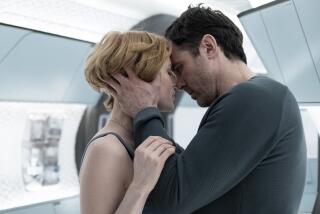DISASTER WASN’T IN THE SCRIPT : Challenger Stuns a Nation Used to Hollywood’s Space Triumphs
- Share via
Sixteen-year-olds today weren’t even born when man first set foot on the moon in 1969, let alone when three astronauts perished in a 1967 space-capsule fire on the ground.
But they sure as shootin’ remember when Luke Skywalker first encountered the Empire. Or when aliens made “Close Encounters of the Third Kind” with Earthlings, or the space odysseys of “2001” and “2010.” Or who knows how many more outer-space fantasies.
Great stuff, too. And most of it all so clean and unreal. People are blown to pieces, whole planets are blown to smithereens! Maybe millions of people were eliminated when the Death Star finally was demolished in “Star Wars.” All this, and yet usually there are no bodies to deal with and certainly no blood.
Why, the explosions on the movie screens look much like the one of the space shuttle Challenger repeated endlessly on our TV screens recently.
I, for one, was astonished by the extent of the shock and outpouring of grief that the disaster received. But the national reaction to the Challenger tragedy--especially by schoolchildren--made me realize that we now have a generation or more of youths whose only experience with space exploration is that of success. All they have ever heard is the TV announcer saying, “Another shuttle mission has been successfully completed,” and it somehow seems appropriate because, after all, didn’t Luke Skywalker win, too?
With all this space fantasy--including the uninterrupted success story of the U.S. space program--I think many of us simply forgot how dangerous space travel is. In our minds, at least, fantasy and NASA’s exploits merged.
But in this most recent episode, the good guys died. And to many, what shouldn’t have been a shock, was.
It seems to me this country is awfully lucky that there haven’t been more deaths over the years in the space program. I mean, exploring space is a dangerous business, isn’t it?
In the ‘60s, when I used to wake up before sunrise to watch TV coverage of the original Mercury astronauts take off on their brief missions, I was petrified at the thought of what could happen. Everyone was aware of the ever-present chance of death. We were held in suspense when John Glenn made his fiery re-entry. A risky business, indeed.
But somewhere along the way, we as a nation lost the sense of what it means to brave the unknown. Some of us had become blase. TV and newspapers slackened in their coverage of launches and landings. Space became our new best friend.
The explosion of Challenger changed all that. In the aftermath, space seems again the frontier--as alien to us as the oceans once were to the Polynesian and European explorers. We’ve learned again that dangers abound. Yet that kind of thinking was not what we witnessed in the media coverage of the public’s reaction.
It was as if we were trying to hold on to the fantasy. We saw news programs and articles talking about how we can help children cope with the tragic loss of seven astronauts. Programs as respected as “Nightline” and “20/20” devoted segments to the subject.
What became apparent in all this is that we forgot to tell the children (and remind ourselves) that peril is involved. That mankind has never made strides without taking losses. That this sort of adventure is known as exploration.
That this isn’t the movies.
Those who explore the unknown know there are risks. Magellan lost four ships, more than 200 crewmen’s lives, and his own, in man’s first mission to sail around the world; Lewis and Clark probably lost some members of their exploration party. When you go out in search of, say, a missing person in real life, you may never find him. But if you’re in “Star Trek” on board the Starship Enterprise, like magic--of course--you’ll find the missing Mr. Spock.
I wonder what will become of the space-film genre, or the films where Rambo-like “heroes” mow down countless humans. Even in something as innocuous as the current comedy “Down and Out in Beverly Hills,” a quick scene of a rocket being jettisoned, with an accompanying “boom” sound, has reportedly caused a stir in audiences.
Will all the children and adults who were so shaken by a real space disaster still be entertained by watching movies filled with special-effects explosions, death and destruction? Will fantasy continue to be confused with real risks? Or will we all be watching with a new sense of humanity?
Will we come back down to Earth?
More to Read
Only good movies
Get the Indie Focus newsletter, Mark Olsen's weekly guide to the world of cinema.
You may occasionally receive promotional content from the Los Angeles Times.









